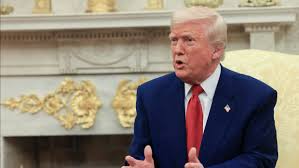Trump says Israel and Iran violated ceasefire, blames Israel more: ‘really unhappy’

In a dramatic turn of events following a short-lived truce, former U.S. President Donald Trump has publicly condemned both Israel and Iran for violating the ceasefire he helped broker. However, his sharpest rebuke was reserved for Israel, which he accused of launching strikes just hours after the agreement went into effect. “Really unhappy,” Trump said, describing his disappointment in the country’s conduct during a White House briefing.
A Ceasefire That Barely Began
The ceasefire, hailed initially as a diplomatic breakthrough, was brokered after nearly two weeks of escalating conflict between Israel and Iran. Trump, taking personal credit for the temporary pause in hostilities, announced the truce with confidence on June 24. However, within hours of implementation, reports surfaced of renewed missile launches and airstrikes.
According to Israeli sources, Iran violated the ceasefire two to three hours after it began by launching rockets toward strategic sites. Tehran, however, denied these allegations, claiming that no such attacks were authorized or carried out.
Israel, on the other hand, did not deny launching airstrikes. In fact, it justified its actions by alleging ongoing threats from Iranian proxy groups and the need to protect its national security. Yet the timing—immediately after the ceasefire—prompted backlash from Trump, who said the strikes undermined the fragile peace.
Trump: ‘They Don’t Know What They’re Doing’
At a press briefing, Trump minced no words. “They don’t know what they’re doing. Both of them,” he said, referring to Israel and Iran. “But I’m really, really unhappy with Israel. We gave them the space to take a step back, and they unloaded right after we made the deal.”
The unusually harsh tone toward Israel marks a noticeable shift in Trump’s traditional rhetoric. During his presidency, Trump was widely considered one of the most pro-Israel leaders in U.S. history, recognizing Jerusalem as Israel’s capital and backing the Abraham Accords. However, his latest comments suggest a growing frustration with the current Israeli leadership.
Urgent Call for Restraint
Trump took to Truth Social to issue a public appeal, urging Israel to halt its military operations. In a now-viral post, he wrote:
“ISRAEL. DO NOT DROP THOSE BOMBS. IF YOU DO IT IS A MAJOR VIOLATION. BRING YOUR PILOTS HOME, NOW!”
The message was clear: any further military action would be seen as a breach of trust, potentially derailing all efforts toward de-escalation.
Meanwhile, Trump also called on Iran to act responsibly. While his criticism was less scathing, he emphasized that the success of the ceasefire depended on mutual cooperation, not tit-for-tat accusations. “If Iran keeps denying but missiles keep flying, that’s not peace. That’s deception,” he stated.
A Fragile Truce Under Fire
The international community, already on edge over the possibility of a full-blown regional war, expressed concern about the apparent unraveling of the ceasefire. European leaders, along with the United Nations, called for an immediate return to diplomacy and cautioned both countries against actions that could reignite violence.
Human rights organizations highlighted the impact of continued military operations on civilians. Reports from both Israel and Iran cited casualties, damaged infrastructure, and widespread fear among populations already living under extreme stress.
Political Motives and Strategic Calculations
Analysts suggest Trump’s public criticism may serve multiple purposes. Firstly, it positions him as a global peacemaker ahead of the 2024 U.S. election season, showing that he can lead in times of international crisis. Secondly, it distances him from Israeli Prime Minister Benjamin Netanyahu, whose leadership style and policies have become increasingly controversial, even within pro-Israel circles in the U.S.
“Trump is clearly trying to recast his foreign policy legacy as one of balance and strength,” said Dr. Rina Goldberg, a political scientist at Georgetown University. “This is also a calculated move to appeal to American voters who are tired of endless wars and want to see strong leadership without blind allegiance.”
Where Do Things Stand Now?
Despite Trump’s efforts, the ceasefire now hangs by a thread. Israel maintains that it will defend its sovereignty if provoked, while Iran continues to deny any breach. U.S. diplomats have reportedly been working around the clock to salvage the agreement, engaging with Middle Eastern allies and pushing for back-channel talks.
Trump has hinted that unless both sides show restraint, he may withdraw his support for future peace initiatives. “You want my help, then act like you deserve it,” he said. “Otherwise, I walk.”
Conclusion: Peace in Peril, Accountability Needed
The Trump-brokered ceasefire was a bold attempt to pause hostilities, but its near-immediate breakdown underscores the deep distrust between Israel and Iran. Trump’s criticism—especially of Israel—signals a shift in tone, reflecting the seriousness of the violations.
As violence threatens to spiral again, global attention turns to the two nations—and to Trump’s next move. Whether he can truly broker lasting peace, or whether his intervention will only serve as a temporary pause in a much deeper conflict, remains to be seen.






